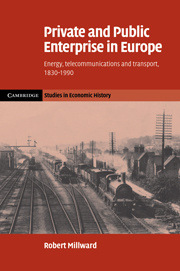Description
Private and Public Enterprise in Europe
Energy, Telecommunications and Transport, 1830–1990
Cambridge Studies in Economic History - Second Series
Author: Millward Robert
A comparative history of the economic organisation of energy, telecommunications and transport in Europe, first published in 2005.
Language: English
Subject for Private and Public Enterprise in Europe:
Approximative price 56.06 €
Subject to availability at the publisher.
Add to cart
Private and Public Enterprise in Europe
Publication date: 07-2008
Support: Print on demand
Publication date: 07-2008
Support: Print on demand
Approximative price 135.96 €
Subject to availability at the publisher.
Add to cart
Private and public enterprise in Europe: Energy, telecommunications and transport 1830-1990
Publication date: 06-2005
372 p. · 15.2x22.9 cm · Hardback
Publication date: 06-2005
372 p. · 15.2x22.9 cm · Hardback
Description
/li>Contents
/li>Biography
/li>
This 2005 book is a comparative history of the economic organisation of energy, telecommunications and transport in Europe in the nineteenth and twentieth centuries. It examines the role that private and public enterprise have played in the construction and operation of the railways, electricity, gas and water supply, tramways, coal, oil and natural gas industries, telegraph, telephone, computer networks and other modern telecommunications. The book begins with the arrival of the railways in the 1830s, charts the development of arms' length regulation, municipalisation and nationalisation, and ends on the eve of privatisation in the 1980s. Robert Millward argues that the role of ideology, especially in the form of debates about socialism and capitalism, has been exaggerated. Instead the driving forces in changes in economic organisation were economic and technological factors and the book traces their influence in shaping the pattern of regulation and ownership of these key sectors of modern economies.
Part I. Introduction: 1. Ideology, technology and economic policy; Part II. The Construction of the New European Infrastructure c. 1830–1914: 2. Infrastructure development and rights of way in the early nineteenth century; 3. Local supply networks, private concessions and municipalisation; 4. Railways and telegraph: economic growth and national unification; 5. Electricity supply, tramways and new regulatory regimes c. 1870–1914; Part III. Nations and Networks 1914–45: 6. Infrastructure development from the nineteenth to the twentieth century: an overall perspective; 7. The development of telecommunications; 8. Network integration in electricity supply: successes and failures; 9. Railway finances and road-rail competition; Part IV. State Enterprise 1945–90: 10. The new state, economic organisation and planning; 11. Coal, oil and security; 12. Airline regulation and the transport revolution; 13. Telecommunications: from calm to storm; 14. Economic policy, financial accountability and productivity growth; Part V. Conclusions: 15. The road to privatisation and de-regulation?
Robert Millward is Professor of Economic History at the University of Manchester. His previous publications include Public and Private Ownership of British Industry 1820–1990 (1994) and The Political Economy of Nationalism in Britain 1920–50 (1995).
© 2024 LAVOISIER S.A.S.




